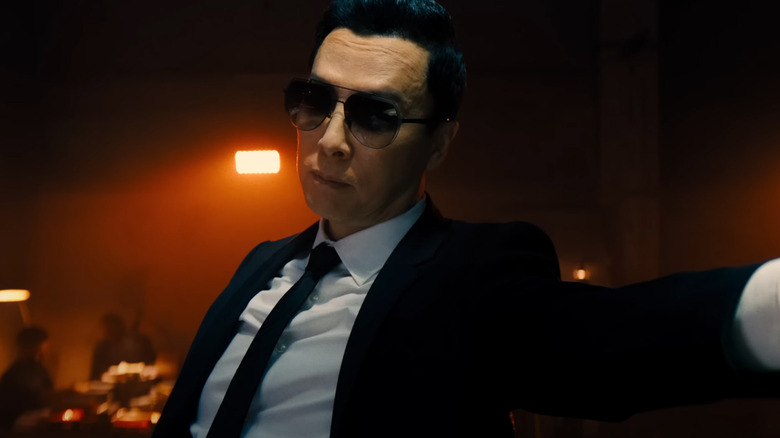John Wick 4: The WUXIA Radio Station In Paris Means More Than You Might Think
In an interview with Looper about "John Wick: Chapter 4," director Chad Stahelski admitted that the team behind the "John Wick" franchise isn't following some sort of prewritten, overarching plan, but simply coming up with ideas for new entries as they come. Of course, "John Wick" is defined not just by an ongoing storyline, but likewise by an amalgam of influences that unify each film through a signature, idiosyncratic style.
The third act of "John Wick 4," which takes place in Paris, incorporates a radio station with the network ID WUXIA. This name is an unsubtle nod to the wuxia genre of Chinese fiction, and an acknowledgement of the extent to which the genre influenced that signature style that defines "John Wick."
In 2014, the British Film Institute's website published a list of notable wuxia films that begins by citing the Dictionary.com definition for the term wuxia, which reads, "a genre of Chinese fiction and film, concerning the adventures of sword-wielding chivalrous heroes." This list eventually culminates with two movies that were huge hits in the United States upon their respective releases: Ang Lee's "Crouching Tiger, Hidden Dragon," and the 2002 Jet Li action epic "Hero." The heavily stylized and intricately choreographed action sequences in "John Wick," then, are apparently so indebted to the style of wuxia films like "Crouching Tiger" that "John Wick 4" made an effort to shout out the genre explicitly.
John Wick 4 also features an actor with experience in wuxia films
"John Wick" pulls from a wide variety of real-life inspirations in the conception of its fictional world, ranging from its Continental Hotel's equivalence to the nation of Switzerland's neutrality, to hotel owner Winston (Ian McShane) functioning in a manner akin to Greek mythological god Hades. The influence of wuxia films is likewise apparent in "John Wick" from its debut, to the extent that director Chad Stahelski has described the franchise's style of action as "gun-fu," mashing up John Wick (Keanu Reeves)'s weapon of choice with the Chinese term for martial arts.
Perhaps the most explicit link between "John Wick" and the wuxia genre other than the name of the WUXIA radio station in "John Wick 4" is its casting of Donnie Yen as the assassin Caine. Yen is a real-life martial artist and one of the most popular stars of present day Hong Kong cinema. Arguably his most iconic role is his multi-film portrayal of the influential wing chun kung fu master Ip Man in the film series of the same name. Yen is also an accomplished wuxia actor, appearing even as an antagonist opposite Jet Li in "Hero."
It's no secret, then, that the "John Wick" universe's architects are plenty inspired by the wuxia genre, sharing their love for Chinese martial arts epics with their sizable audience through a variety of means.

